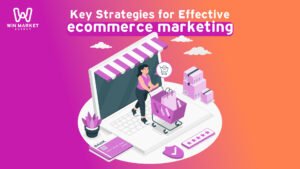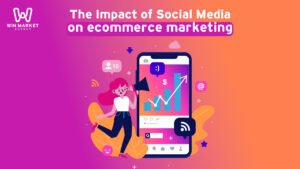In today’s competitive online landscape, mastering e-commerce marketing is essential for driving sales and building a strong digital presence.
ecommerce marketing
Effective ecommerce marketing strategies encompass a variety of tactics, including targeted advertising, personalized content, and data-driven decision-making.
By leveraging these strategies, businesses can enhance customer engagement, optimize their sales funnel, and achieve significant growth.
At winmarket agency , we specialize in crafting tailored e-commerce marketing solutions that align with your brand’s goals and help you stand out in the digital marketplace.
Key Strategies for Effective ecommerce marketing

In the competitive world of e-commerce, businesses must adopt effective marketing strategies to stand out and drive success. Crafting a compelling e-commerce marketing plan involves more than just attracting visitors to your website; it requires a comprehensive approach that nurtures customer relationships and maximizes sales.
Here are some key strategies to consider for effective ecommerce marketing:
- Optimize Your Website for Conversions
- The foundation of a successful e-commerce marketing strategy is a well-optimized website.
- Ensure that your site is user-friendly, with intuitive navigation, fast loading times, and a mobile-responsive design.
- Use high-quality images, detailed product descriptions, and clear calls-to-action (CTAs) to guide visitors towards making a purchase.
- Implement A/B testing to continually refine your website elements and improve conversion rates.
- Leverage Search Engine Optimization (SEO)
- SEO is crucial for increasing your online visibility and driving organic traffic to your e-commerce site.
- Conduct keyword research to identify relevant terms and phrases that potential customers are searching for.
- Optimize your product pages, category pages, and blog content with these keywords to improve your search engine rankings.
- Additionally, focus on building high-quality backlinks and optimizing your site’s loading speed to enhance its overall SEO performance.
- Utilize Pay-Per-Click (PPC) Advertising
- PPC advertising, including Google Ads and social media ads, can effectively drive targeted traffic to your e-commerce store.
- Create compelling ad copy and use high-intent keywords to attract users who are actively searching for products similar to yours.
- Monitor your campaigns closely and adjust your bids, targeting options, and ad creatives based on performance data to maximize your return on investment (ROI).
- Engage with Email Marketing
- Email marketing remains a powerful tool for nurturing customer relationships and driving repeat sales.
- Build an email list by offering incentives such as discounts or exclusive content.
- Segment your list based on customer behavior, preferences, and purchase history to send personalized and relevant messages.
- Implement automated email campaigns for abandoned cart reminders, product recommendations, and follow-up surveys to enhance customer engagement.
- Harness the Power of Social Media
- Social media platforms offer valuable opportunities for engaging with your audience and promoting your products.
- Develop a strong presence on platforms where your target customers are most active.
- Share compelling content, including product highlights, behind-the-scenes looks, and customer testimonials.
- Utilize social media advertising to reach a broader audience and drive traffic to your e-commerce site.
- Implement Content Marketing
- Content marketing can build brand authority and attract potential customers to your e-commerce store.
- Create valuable and informative content, such as blog posts, videos, and infographics, that addresses your audience’s pain points and interests.
- Optimize your content for SEO to drive organic traffic and establish your brand as a trusted resource in your industry.
- Leverage Data and Analytics
- Data-driven decision-making is essential for optimizing your e-commerce marketing efforts.
- Use analytics tools to track key performance indicators (KPIs) such as traffic sources, conversion rates, and customer behavior.
- Analyze this data to identify trends, measure the effectiveness of your marketing strategies, and make informed adjustments to improve your overall performance.
- Focus on Customer Experience
- A positive customer experience can significantly impact your e-commerce success.
- Ensure that your website provides a seamless and enjoyable shopping experience, from browsing to checkout.
- Offer excellent customer service through multiple channels, including live chat, email, and phone support.
- Collect and act on customer feedback to continually enhance your offerings and address any issues.
In conclusion, implementing these key strategies can significantly enhance your e-commerce marketing efforts and drive growth. By optimizing your website, leveraging SEO and PPC, engaging with email and social media marketing, and focusing on customer experience, you can create a comprehensive and effective marketing plan that sets your business up for success.
The Impact of Social Media on ecommerce marketing

Social media has revolutionized the way businesses approach ecommerce marketing, offering powerful tools and platforms to engage with customers and drive sales. In today’s digital landscape, social media is not just an additional marketing channel but a central component of a comprehensive e-commerce strategy.
Here’s a closer look at how social media impacts ecommerce marketing and why it’s essential for modern businesses.
- Enhanced Brand Visibility and Awareness
- Social media platforms provide an unparalleled opportunity for businesses to increase their brand visibility and reach a global audience.
- With billions of active users across various platforms like Facebook, Instagram, Twitter, and LinkedIn, e-commerce brands can leverage these channels to promote their products and services.
- Regularly posting engaging content and interacting with followers helps build brand awareness and keeps your business top-of-mind for potential customers.
- Targeted Advertising and Promotions
- One of the significant advantages of social media is its ability to deliver highly targeted advertising.
- Platforms like Facebook and Instagram offer sophisticated targeting options that allow businesses to reach specific demographics based on interests, behaviors, location, and more.
- This level of precision ensures that your ads are shown to users who are most likely to be interested in your products, increasing the likelihood of conversions and maximizing your advertising budget.
- Building Customer Relationships and Loyalty
- Social media is a valuable tool for fostering customer relationships and building brand loyalty.
- Engaging with your audience through comments, messages, and interactive posts helps create a sense of community and personal connection.
- By responding promptly to customer inquiries and feedback, you demonstrate that you value their opinions and are committed to providing excellent service.
- This positive interaction can lead to increased customer satisfaction and repeat business.
- Driving Traffic and Sales
- Social media can drive significant traffic to your e-commerce site, leading to increased sales and revenue.
- By sharing compelling content, product updates, and promotional offers, you can direct users to your website where they can make purchases.
- Utilizing social media shopping features, such as Instagram’s shoppable posts and Facebook’s marketplace, allows users to buy directly from the platform, streamlining the purchasing process and boosting sales.
- Leveraging User-Generated Content and Influencers
- User-generated content (UGC) and influencer marketing are powerful strategies that can enhance your ecommerce marketing efforts.
- Encouraging customers to share their experiences with your products and tag your brand on social media provides authentic and relatable content that can influence potential buyers.
- Additionally, partnering with influencers who align with your brand values allows you to reach their followers and gain credibility through their endorsements.
- Gathering Insights and Analytics
- Social media platforms offer valuable insights and analytics that can inform your e-commerce marketing strategy.
- By analyzing metrics such as engagement rates, click-through rates, and conversion rates, you can gain a deeper understanding of your audience’s preferences and behaviors.
- This data-driven approach enables you to refine your content and advertising strategies, optimize performance, and achieve better results.
- Enhancing Customer Support
- Social media has become an essential channel for customer support, providing a convenient platform for addressing customer inquiries and issues.
- Many consumers now expect businesses to offer support through social media, and failing to do so can result in missed opportunities and negative perceptions.
- Implementing efficient social media customer service practices ensures that you can assist customers in real-time and maintain a positive brand reputation.
In conclusion, social media has a profound impact on ecommerce marketing, offering numerous benefits from increased brand visibility and targeted advertising to enhanced customer relationships and sales growth.
By effectively utilizing social media platforms, businesses can engage with their audience, drive traffic, and build lasting customer loyalty.
It may also help you: digital marketing agency in Egypt
ecommerce marketing
In conclusion, boosting your online sales through effective ecommerce marketing requires a strategic approach that leverages various digital channels, optimizes customer experiences, and continuously adapts to market trends.
By focusing on targeted advertising, engaging content, and data-driven decisions, businesses can enhance their online visibility, drive more traffic, and ultimately increase sales.
Let winmarket agency help you transform your e-commerce goals into tangible results and boost your online sales to their full potential.



